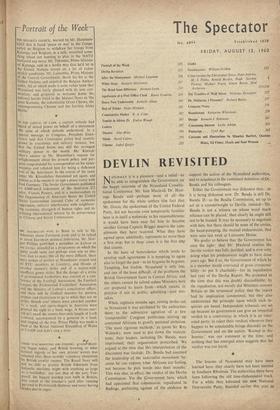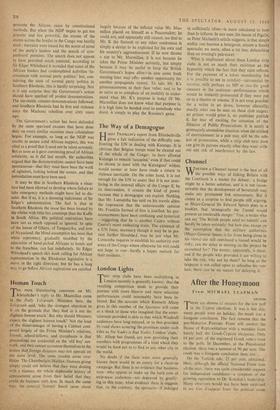DEVLIN REVISITED
NATURALLY it is a pleasure—and a relief—to be able to congratulate the Government on the happy outcome of the Nyasaland Constitu- tional Conference. Mr. lain Macleod, Dr. Hast- ings Banda and—perhaps most of all—the spokesmen for the white settlers (the fact that Mr. Dixon, the spokesman of the United Federal Party, did not become even temporarily familiar here is in itself a testimony to his reasonableness; it would have been easy for him to become another Group Captain Briggs) deserve the com- pliments they have received. What they have agreed upon, admittedly. represents no more than a first step; but in their; cases it is the first step that counts.
In the haze of benevolence which tends to envelop such agreements it is tempting to agree also to forget the past—to let bygones be bygones. Tempting, but foolish. Nyasaland is only one, and one of the least difficult, of the problems the British Government faces in Central Africa; and the others cannot be solved unless Ministers here are prepared to learn from—which means, in practice if not in public, admitting—past mis- takes.
When, eighteen months ago, rioting broke out in Nyasaland it was attributed by the authorities there to the subversive agitation of a few `irresponsible' Congress politicians stirring up contented Africans to gratify personal ambition. 'The most rigorous methods,' to quote Sir Roy Welensky, were used to put down the malcon- tents; their leaders, including Dr. Banda, were imprisoned; their organisation 'proscribed. We argued at the time that this interpretation of the discontent was foolish: Dr. Banda had assumed the leadership of the nationalist movement 'be- cause he can express what Africans are feeling, not because he puts words into their mouths.' This was also, in effect, the verdict of the Devlin Commission. Yet the Govei nment here, which had appointed that commission, repudiated its findings, preferring against all the evidence to support the action of the Nyasaland authorities, and to acquiesce in the continued detention of Dr. Banda and his colleagues.
Either the Government was dishonest then: or it is being dishonest now. Dr. Banda is still Dr. Banda. If—as the Beadle Commission, set up to act as a counterweight to Devlin, insisted—`Dr.
Banda is not a witness on whose word much reliance can be placed,' then clearly he ought still not to be trusted. It may be necessary to negotiate with him, but there should be none of the smiles, the hand-pumping, the mutual endearments, that were seen last week at Lancaster House.
We prefer to believe that the Government has seen the light : that Mr. Macleod realises the Devlin verdict was fully justified, and is now only doing what his predecessors ought to have done years ago. But if so, the Government of which he is a member stands convicted of gross irresponsi- bility—to put it charitably—for its repudiation last year of the Devlin Report. We protested at the time that this was doubly discreditable; by the repudiation, not merely did Ministers commit Britain to the tyrannical policy that the report had by implication condemned, but they also
undermined the principle upon which such in- quiries are based. Independent tribunals are set
up because no government can give an impartial
verdict in a controversy in which it is an inter- ested party; to reject their verdicts whenever they
happen to be unpalatable brings discredit on the Government and on the nation. 'Rooted in dis- honour,' was our comment at the time; and • nothing that has emerged since suggests that the verdict was too harsh.
The lessons of Nyasaland may have been learned here; they clearly have not been learned in Southern Rhodesia. The authorities there have been following the old time-dishonoured track. For a while they, tolerated the new National Democratic Party, founded earlier this year to promote the African cause by constitutional methods. But when the NDP began to get too popular and too powerful, the excuse of the events across the border in the Congo was hastily used : warrants were issued for the arrest of some of the party's leaders and the search of sym- pathisers' premises. The search does not appear to have provided much material; according to Sir Edgar Whitehead it revealed that some of the African leaders had contemplated activities 'in- consistent with normal party politics,' but, con- sidering the state of normal party politics in Southern Rhodesia, this is hardly surprising. Nor is it any surprise that the Government's action should have sparked off protest demonstrations. The inevitable counter-demonstrations followed; and Southern Rhodesia had its first real violence since the Mashona rebellion over sixty years
ago.
The Government's action has been defended by the same spavined excuses that have done duty on every similar occasion since colonialism began. For example, so long as the NDP was unable to secure solid African support, this was cited as a proof that it need not be taken seriously. But as soon as it gave convincing proof of African solidarity, as it did last month, the authorities argued that the demonstrations cannot have been spontaneous—that they must have been the work of agitators, lurking behind the scenes; and that intimidation must have been used.
It may be that in Southern Rhodesia a situa- tion had been allowed to develop where failure to take emergency methods might have led to dis- aster. But if so, it is a damning indictment of Sir Edgar's administration. The fact is that in Southern Rhodesia the numt has been treated by the whites with little less contempt than the Kaffir in South Africa. His political aspirations have been not so much opposed as ignored. In spite of the lesson of Ghana, of Tanganyika, and now of Nyasaland, the bland assumption has been that white supremacy, gradually modified by the admission of hand-picked Africans to hotels and to the franchise, can last indefinitely. Sir Edgar Whitehead's speech this week calling for African representation in the Rhodesian legislative is a move in the right direction; but he has a long way to go before African aspirations are satisfied.



































 Previous page
Previous page